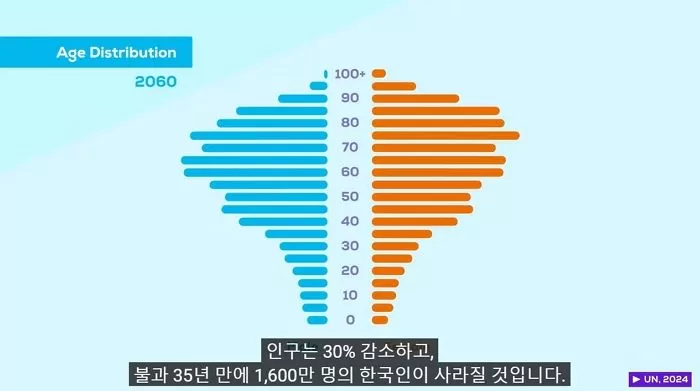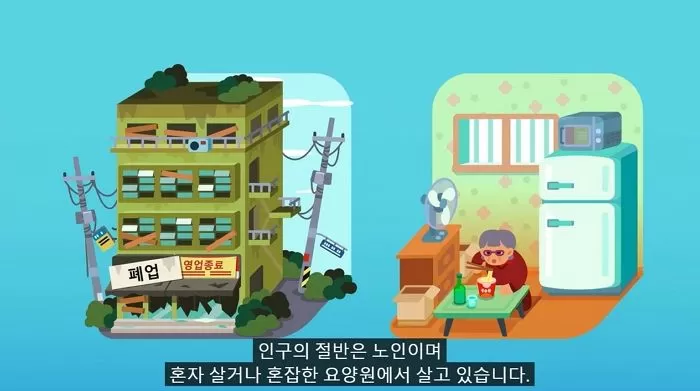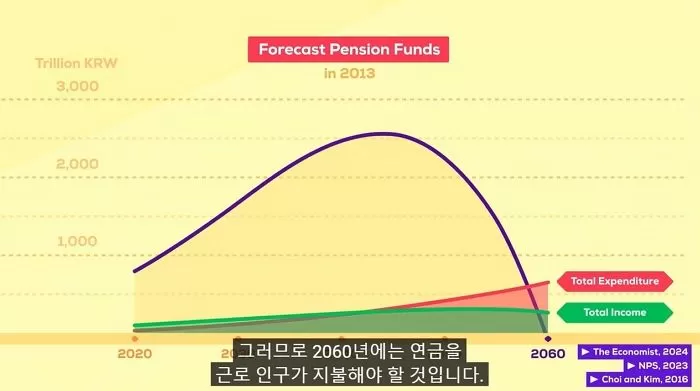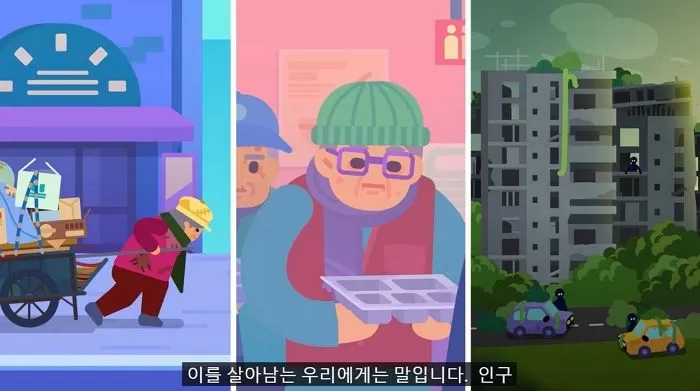**Korea Facing a Population Collapse Crisis, Forecast of Social and Economic Breakdown by 2060**
The popular science YouTube channel 'Kurzgesagt' has released a shocking video titled 'South Korea is over.'
On October 2nd, Kurzgesagt, which has 23.8 million subscribers, pointed out Korea's serious low birth rate issue in its newly uploaded video. It issued a bleak forecast that by 2060, Korean society will collapse demographically, economically, and socio-culturally.

Kurzgesagt emphasized that Korea's birth rate is at its historically lowest level.
While a birth rate of about 2.1 per woman is necessary to maintain the population, Korea saw its birth rate drop from 6 per woman in the 1950s to below 2 in the 1980s, and plummeting to 0.72 in 2023.
Particularly, the birth rate in Seoul is even lower, at 0.55.
The video explained, "If the current birth rate is maintained, out of 100 Koreans, 36 will have children, who will grow up to have 13 kids, and then just 5 will be born from them. In just 4 generations, the 100 Koreans will shrink to 5."

**The Shocking Reality of Population Decline and the 2060 Outlook for Korea**
The video shows Korea's current population pyramid and identifies the shocking reality of 'one 1-year-old child to four 50-year-old adults.'
It warned, "So far, the effects of low birth rates have not been significantly felt, but 'demographic changes' will hit you like a freight train. It might seem faint from a distance, but it will suddenly strike you. Korea will now face that shock."
Based on the UN's low birth rate scenario, the forecast for Korean society in 2060 is grim.
Kurzgesagt predicted that '30% of the population, or 16 million people, will disappear,' 'half of the population will be seniors aged 65 and older,' 'those under 25 will account for less than 10%,' and 'the infant population will be only about 1%.'

Furthermore, it stated, "By 2060, Korea will transform into a strangely quiet country where children do not play, abandoned cities, half the population consisting of the elderly living alone or in overcrowded nursing homes, while a small number of people desperately try to maintain society."
**Economic Collapse and the Pension System Crisis**
The video warns of a high likelihood of economic collapse in Korea by 2060.
It pointed out that Korea's pension system is expected to stop growing in the 2040s and be completely depleted in the 2050s, with the working population insufficient to support retirees.

Kurzgesagt stated, "For the pension system to function, at least 2-3 workers must pay taxes for each retiree. However, by 2060, there won’t even be one worker for each elderly person."
It continued, "The labor force, currently about 37 million, is expected to drop below half to 17 million by 2060." As a result, it predicted that GDP will peak in the 2040s and enter a permanent recession.
**Socio-Cultural Collapse and the Epidemic of Loneliness**
The population decline is expected to have severe consequences for social and cultural aspects as well. By 2060, it is predicted that 50% of 70-year-old Koreans will have no siblings and 30% will have no children.

Young people aged 25 to 35 will make up only 5% of the population, and most will have no siblings, leading to an "unprecedented epidemic of loneliness."
Culturally, it warned that the population driving the Korean Wave including K-POP and K-dramas, ages 25 to 45, will plummet from 17.5 million (37%) in 2000 to 5.6 million (16%) by 2060, leading to "the soul of Korean culture shrinking and disappearing."
Additionally, considering that North and South Korea remain in a state of war, the decrease in the eligible young population poses a serious threat to national defense.
Currently, 5% of combat-ready age males are serving in the military, but to maintain the same troop levels in 2060, 15% will have to serve.

**Causes of Low Birth Rate and Global Phenomenon**
Kurzgesagt explained that Korea's population collapse is part of a global phenomenon. In 2023, China's birth rate is at 1.0, Italy and Spain at 1.2, Germany at 1.4, and the UK and the US at 1.6, with most developed nations below the population replacement rate.
It also analyzed, "The strangest thing is that nearly everyone participating in public discourse does not genuinely understand the severity of the situation."
It emphasized that low birth rates are not simply a worker shortage issue but an "existential threat to our society, culture, wealth, and lifestyle."
Domestic internet users who viewed the video reacted by saying, "The explanation of the causes is sharp enough that it doesn't feel like it's from a foreigner," "If this continues, the country will perish by 2100. By 2060, everyone here will still be alive, so we should prepare in advance."

Kurzgesagt identified unique work culture formed during rapid economic development and extreme competition as causes of Korea's drastic low birth rate. It also noted that outdated cultural norms further exacerbate the situation.
In 2023, only 4.7% of children born in Korea were to unmarried women.
Among advanced countries, Korean men play the smallest role in household and childcare, leading women to face disproportionate burdens to maintain their work life after pregnancy.
It concluded that "Korea has created a culture that prevents people from having children," which leads to demographic collapse.
Image source: youtube 'kurzgesagt – in a nutshell'


